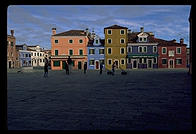|
Italy has always been my favorite country for tourism. It combines artistic
treasures, friendly people, a beautiful language, fascinating history, and great
food. You could be a tourist here for your whole life and still there would have
been something worthwhile up a little country road or behind an obscure church
that you hadn't seen.
Sixty million Italians share a peninsula 800 miles long by about 100 miles
wide (75% of the size of California). Rome is at about the same latitude as New
York City, but the surrounding Mediterranean results in milder winters.
The main problem with Italian tourism is that while you are there trying to
soak up medeival atmosphere and Roman history, 60 million Italians are trying to
ignore it. You were just enjoying an arch over a narrow medeival street when
three of the ubiquitous motorbikes come roaring through, shattering your
eardrums. You were trying to imagine how Marcus Aurelius felt as he surveyed the
forum when a herd of noisy schoolchildren are herded through on a mandatory trip,
oblivious to their guide. If you want to experience Italy as it once was, you
have to either go to a town so small they don't have motorbikes (if you find one,
let me know) or a place where cars are impractical (Venice and Capri).
The standard tour of Italy starts in Rome with the Vatican and the ancient
buildings from the Empire. One then proceeds to Florence to admire the flowers of
the Renaissance and finishes up in Venice for the atmosphere and more art. Still,
I think my friend Stephen had the best trip to Italy. He went to Vicenza with his
wife and lived like an unemployed Italian for a week, mostly sitting in cafes.
You'll never see it all so you might as well enjoy the Italian
lifestyle.
|
